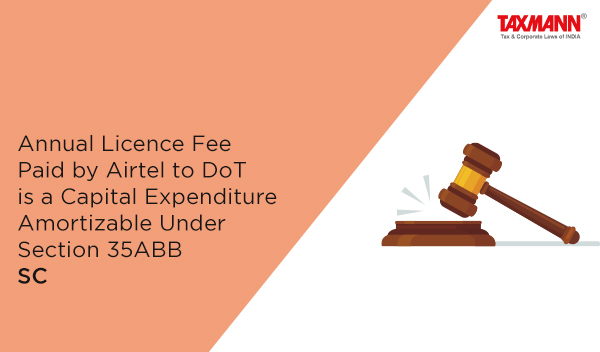Annual Licence Fee Paid by Airtel to DoT is a Capital Expenditure Amortizable Under Section 35ABB | SC
- Blog|News|Income Tax|
- 3 Min Read
- By Taxmann
- |
- Last Updated on 18 October, 2023

Case Details: Commissioner of Income-tax v. Bharti Hexacom Ltd. - [2023] 155 taxmann.com 322 (SC)
Judiciary and Counsel Details
-
- B.V. Nagarathna & Ujjal Bhuyan, JJ.
Facts of the Case
The assessee company was engaged in the business of telecommunication services and value-added related services. It initially procured a licence from the Government for telecommunication services under the 1994 agreement, which New Telecom Policy, 1999 subsequently governed. In terms of the licence agreement, the assessee had to pay an entry fee payable up to 31-7-1999, and, thereupon, the licence fee was payable as a percentage of gross revenue under the licence effective from 1-8-1999.
The Delhi High Court apportioned the licence fee as partly revenue and partly capital by dividing the licence fee into two periods, i.e. before and after 31-7-1999. Accordingly, it was held that the licence fee paid or payable for the period up to 31-7-1999, i.e., the date set out in the Policy of 1999, should be treated as a capital expense, and the balance amount payable on or after the said date should be treated as a revenue expense.
Supreme Court Held
On appeal, the Supreme Court held that as per the Policy of 1999, there was to be a multi-licence regime since any number of licences could be issued in a given service area. Further, the licence was for a period of twenty years instead of ten years as per the earlier regime. The migration to the Policy of 1999 was on the condition that the entire policy must be accepted as a package, and consequently, all legal proceedings and disputes relating to the period up to 31-7-1999 were to be closed. If the migration to the Policy of 1999 was accepted by the assessees herein or the other service providers, then all licence fee paid up to 31-7-1999 was declared as a one-time licence fee as stated in the communication dated 22-7-1999 which was treated to be a capital expenditure.
The licence granted under the Policy of 1999 was non-transferable and non-assignable. More importantly, if there was a default in the licence fee payment, the entire licence could be revoked after sixty days’ notice.
The view of the Delhi High Court was not right in apportioning the expenditure incurred towards establishing, operating and maintaining telecom services as partly revenue and partly capital by dividing the licence fee into two periods, that is, before and after 31-7-1999 and holding that the licence fee paid for the period upto 31-7-1999 should be treated as capital and the balance amount payable on or after the said date should be treated as revenue.
The nature of payment being for the same purpose cannot have a different characterisation merely because of the change in the manner or measure of payment or, for that matter, the payment being made on an annual basis. Therefore, the nomenclature and the manner of payment are irrelevant.
The payment post 31-7-1999 was a continuation of the payment pre 31-7-1999, albeit in an altered format, which does not take away the essence of the payment. It was a mandatory payment traceable to the foundational document, i.e., the license agreement as modified post-migration to the 1999 policy. The consequence of non-payment would result in the ouster of the licensee from the trade. Thus, this is a payment which is intrinsic to the existence of the licence as well as trade itself.
Accordingly, variable annual licence fees paid by the assessees to the DoT under the Policy of 1999 are capital in nature and may be amortised in accordance with section 35ABB.
Disclaimer: The content/information published on the website is only for general information of the user and shall not be construed as legal advice. While the Taxmann has exercised reasonable efforts to ensure the veracity of information/content published, Taxmann shall be under no liability in any manner whatsoever for incorrect information, if any.

Taxmann Publications has a dedicated in-house Research & Editorial Team. This team consists of a team of Chartered Accountants, Company Secretaries, and Lawyers. This team works under the guidance and supervision of editor-in-chief Mr Rakesh Bhargava.
The Research and Editorial Team is responsible for developing reliable and accurate content for the readers. The team follows the six-sigma approach to achieve the benchmark of zero error in its publications and research platforms. The team ensures that the following publication guidelines are thoroughly followed while developing the content:
- The statutory material is obtained only from the authorized and reliable sources
- All the latest developments in the judicial and legislative fields are covered
- Prepare the analytical write-ups on current, controversial, and important issues to help the readers to understand the concept and its implications
- Every content published by Taxmann is complete, accurate and lucid
- All evidence-based statements are supported with proper reference to Section, Circular No., Notification No. or citations
- The golden rules of grammar, style and consistency are thoroughly followed
- Font and size that’s easy to read and remain consistent across all imprint and digital publications are applied



 CA | CS | CMA
CA | CS | CMA
